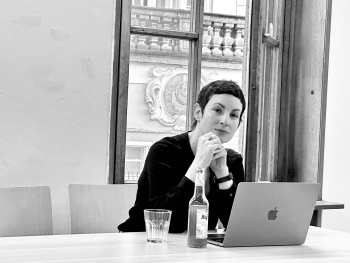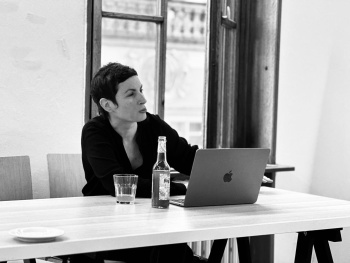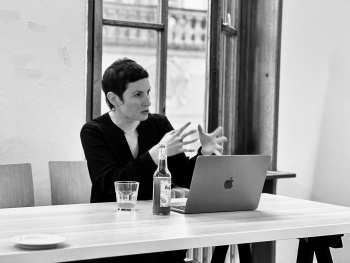Valérie Roberge teaches at the Faculty of Philosophy at Université Laval, Québec, Canada. She focuses on philosophy of Soren Kierkegaard, but is also a literary critic. Her latest lecture for Charles University, given for Společnost pro filosofickou antropologii, dealt with philosophical aspects of walking.

© Tatiana Chavalková Badurová.
Valérie has always felt a strange attraction to Prague due to books by Milan Kundera. Her second lecture for FHS was a great opportunity to ask her how her love of wisdom and literature combine and what philosophy means to her.
I teach an introduction to critical thinking and I’m going to assist a course on Kierkegaard.
I think I don’t see them separately. For some questions, especially the existential ones, literature and philosophy walk hand in hand. I tend to see where they meet instead of where they separate. However, their respective perspectives on a meeting point are different, which gives a larger view on a topic, more structure and requires to find the coherence in the whole view. It’s in the coherence/incoherence research as much as in the shape and content, that they, for me, enrich each other.

© Tatiana Chavalková Badurová.
It’s simple: the basic desire to better comprehend the world and the individual which brings me to philosophy. Could I be cryptic and only say: the capacity to live more easily with uncertainty? To ask questions, to fight for what you believe in, to listen to others, to be open to new ideas, to be capable of flexibility, irony, humor and so on.
My first thought was if you don’t feel the risk, you’re not doing philosophy. Philosophy for me enriches by the way it cuts to the essential, helps us see the truth (which is often less comfortable than what we hope it was), and helps us make the modifications in our own life so that it’s coherent with our thought and values. Thought and values can change throughout the years, so the process and the modifications needed are never completed.
To answer this question, I’ll quote Pierre Hadot, French philosopher specialized in old Greek philosophy, who puts emphasis on the word sophia in philosophia, which means both knowledge and savoir-faire (know how) and was not separated at the time. So yes, for me, philosophy could also be lived and what it means in its idealistic view is that thoughts and actions should not be separated – or more elegantly put, thoughts and actions should be coherent. You can see I’m repeating myself, and I might add “could also be lived” is an understatement as I am more turned toward the savoir-faire or way of living. For me, it is foremost lived, and then thought. At the core of my answer, you can see how I’m taking this position, and then acting accordingly to it.
I would like to say no to this question and go to the other one but that would not be fair and lack consideration regarding the world we live in. It’s been a long time since I’m in the academy and it wouldn’t be fair to not recognize the specific difficulty for women to be in it. There are still plenty of prejudices and expectations toward women that are in the way. For example, how should we look? Should we act this or that way? Could we say this? Is it acceptable for us to say that? Is it not too much to say that? Are you not too controlling? Too bossy? Too emotional? Not enough emotional? Too ambitious? Not humble enough? Too humble? And it goes on and on. In the same manner, imposter syndrome affects more women than men… Is it insurmountable? No, but don’t expect everybody to accept you as you are.

© Tatiana Chavalková Badurová.
Let me go back to the previous question as critical thinking is mostly a skill and not only a concept. I teach critical thinking by giving the tools of knowledge: concepts, ideas, and lectures so that students can identify what they are looking at, master the concept and talk about it. Afterward, I ask them to practice what they have learned by reading texts critically, showing critical thinking skills in philosophical texts, and also by doing a self-reflecting diary in which they reflect on their own critical thinking practice in their daily life. It could be as simple as to realise whether you were critically thinking when you were arguing with your friends or your partner. So, I don’t really teach critical thinking, but I try to give them a way of practicing critical thinking.
I don’t know if I know Prague well but I’m not a complete stranger or tourist in the city anymore. It’s hard to know what attracted me to Czech culture in the first place; however, to Kundera it was humor and a way of seeing the world that I’ve never seen anywhere else. It’s a love story, a friendship story like for all the authors you loved, and like all good love stories there is an unknown part, a desire, something that you do not possess; however, it is present there, and you want more. It’s also a friendship where you learn from the other one and learn about yourself under this new light. Strangely enough, now that I’ve been to Prague and know more Czechs, I can see how Kundera is so Czech, how Kafka was influenced by the city, and how Hasek is the biggest prankster. Does it still inspire me? Yes. Do I feel that I understand them better? Yes and no, there is this new layer of comprehension, which is denser and denser the more I know about Czech culture and the place. Does Czech culture still attract me? Even more! It is a strange feeling of familiarity mixed with an even bigger unknown feeling.
Interview conducted by Tatiana Chavalková Badurová, a Ph.D. student of philosophy at FHS UK and the head of SFA.
Univerzita Karlova
Fakulta humanitních studií
Pátkova 2137/5
182 00 Praha 8 - Libeň
Identifikátor datové schránky: piyj9b4
IČ: 00216208
DIČ: CZ00216208